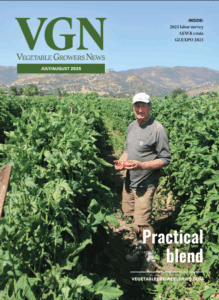Jul 29, 2020Director of Pennsylvania Agricultural Experiment Station steps down
Gary Thompson, associate dean for research and graduate education and director of the Pennsylvania Agricultural Experiment Station in Penn State’s College of Agricultural Sciences, will step down, effective July 31.
He will start Aug. 24 as the executive director of the Southern Association of Agricultural Experiment Station Directors – a consortium of agricultural research directors at land-grant universities in 13 southeastern states and two U.S. territories – where he will lead national and regional efforts to promote a broad portfolio of research in agriculture and natural resources. He will be based at the University of Arkansas in Fayetteville.

Since arriving at Penn State from Oklahoma State University in 2011, Thompson has administered an annual research budget that has grown by 20% under his watch – to more than $110 million the last four years, including a high of $125 million in 2018 – and has overseen the college’s 16 graduate education programs, as well as its participation in eight intercollege graduate degree programs.
He guided Penn State agricultural research efforts through some challenging times – from steep state budget cuts to pandemic-related disruptions – while leading the development and implementation of several innovative programs.
For instance, Thompson led efforts to strengthen the research commercialization portfolio in the college. He worked with the college’s Entrepreneurship and Innovation program to establish the Research Applications for INnovation grant program, known as RAIN, which helps researchers bridge the gap between the laboratory and the market.
Since the program’s inception, 21 RAIN grants totaling more than $1.3 million have led to the commercialization of technologies developed by college researchers. Several startup companies have emerged from the program, which has become a model for similar programs in other Penn State colleges.
Thompson also launched the Strategic Networks and Initiatives Program, known as SNIP. Begun as a seed-grant program, this initiative was designed to encourage the creation of interdisciplinary teams to conduct collaborative research.
SNIP has evolved into a three-level grant program: a level-one grant provides initial funding to help organize a research team; a level-two award helps established teams generate preliminary data in preparation for seeking larger, competitive grants; and a level-three grant funds a cohort of graduate students to enhance faculty research programs.
Level-three awards provide two years’ worth of funding for up to five doctoral students. This funding has helped create cohorts in biodiversity and pollinators, phytobiomes, and gender in agriculture and the environment. These cohort grants have been leveraged to generate additional funding that exceeded the original amounts of the grants, providing faculty with opportunities to expand their research programs.
Aided by a “cluster hire” of faculty researchers and the phytobiome cohort created under the SNIP initiative, Thompson and the college also led the charge to create a focus on microbiome research at Penn State. This initiative, which turned into the Microbiome Center – now housed in the Huck Institutes of the Life Sciences – provided a place for these new faculty to convene and collaborate with established faculty across academic departments. In addition, the phytobiome SNIP cohort infused graduate student researchers into the center, contributing to its successful launch.
The most recent achievement under Thompson’s leadership is the formation of the Institute for Sustainable Agricultural, Food, and Environmental Science. The new institute houses already-established programs — such as the Agriculture and Environment Center and the Environmental Resource Management undergraduate program — and provides an expanded platform for a collaborative community of researchers, students and stakeholders.
This institute, abbreviated as SAFES, is structured to examine large-scale, landscape-level problems, collect data, incorporate that data in modeling and then integrate the models to develop solutions. Researchers and educators affiliated with SAFES will generate and disseminate knowledge with Pennsylvania communities through a shared-discovery approach.
In addition, Thompson spearheaded improvements at the college’s three regional research and extension centers.
At the Fruit Research and Extension Center in Adams County, he facilitated new graduate student housing and an agricultural engineering fabrication facility. Under his guidance, the Southeast Agricultural Research and Extension Center in Lancaster County collaborated with the college’s Agriculture and Environment Center and Penn State Harrisburg to integrate water quality programs affecting Chiques Creek, a tributary of the Susquehanna River and Chesapeake Bay. At the Lake Erie Regional Center for Grape Research and Extension in Erie County, he helped forge a partnership with Penn State Behrend for center leadership and faculty in residence.
“Gary intensified our focus on research excellence, including encouraging departments to identify and pursue research signature areas, which will continue to raise our college’s research profile and competitiveness for the most qualified students,” said Rick Roush, dean of the College of Agricultural Sciences.
“He has been a consistent advocate in every respect for moving research to innovation, and he has been an impassioned supporter of increasing our graduate student numbers and graduate student support, especially for underrepresented groups,” he added. “As associate dean, Gary is leaving us with a remarkable legacy.”
Roush said Senior Associate Dean Steven Loerch will take on the additional duties of associate dean for research and graduate education during the national search for Thompson’s successor.
















